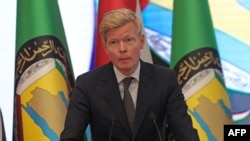The recent agreement to extend the UN truce between the warring parties in Yemen until August 2 “represents a significant shift in the trajectory of the war,” said UN Special Envoy for Yemen Hans Grundberg.
The conflict in Yemen started in 2014 when Iran-backed Houthi rebels seized large swaths of the country, eventually forcing the internationally recognized president of Yemen into exile and disrupted the country’s peaceful transition process. At the request of the Yemeni government, Saudi Arabia led a coalition of countries against the Houthis beginning in March 2015. An estimated 377,000 people have died during the conflict and the country has been plunged into poverty and hunger.
At the start of Ramadan on April 2, the UN brokered a two-month truce, leading to a significant drop in civilian casualties, improved mobility, and increased access to fuel and basic goods. The conflict parties agreed to extend the truce an additional 60 days on June 2. “By agreeing to implementing and now renewing the truce, the parties have provided a rare glimmer of hope to Yemenis that an end to this devastating conflict is possible,” said UN Special Envoy Grundberg.
President Biden welcomed the truce extension and noted “the last two months in Yemen, thanks to the truce brokered in April, have been among the most peaceful periods since this terrible war began seven years ago. Thousands of lives have been saved as fighting receded.”
President Biden praised the “tireless work” of UN Special Envoy Grundberg and U.S. Special Envoy for Yemen Tim Lenderking in helping to secure the truce extension. He also applauded the “cooperative diplomacy” from across the region, saying “Saudi Arabia demonstrated courageous leadership by taking initiatives early on to endorse and implement terms of the UN-led truce. Oman played a central role in hosting and facilitating dialogue. Egypt and Jordan opened their airports to flights from Yemen over the past month thereby enabling a key component of the truce process.”
Ending the war in Yemen is a top U.S. foreign policy priority. Secretary of State Antony Blinken reiterated the United States’ commitment to “an inclusive, durable resolution to the conflict that alleviates the suffering of Yemenis, that empowers them to determine the future of their country without foreign interference, and that addresses calls for justice and accountability. … We urge [all parties] to seize this pivotal moment to begin a comprehensive peace process.”














